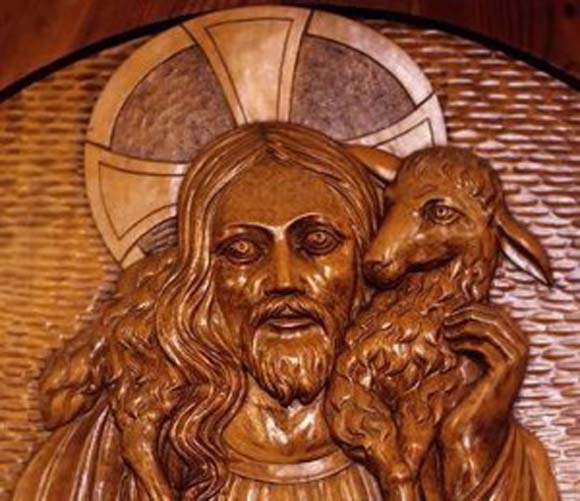
‘the Father and I are one’
Readings: Acts of the Apostles 13:14, 43-52; Psalm 99; Revelation 7:9, 14-17; John 10: 27-30
When getting to grips with the extracts of scripture the Church presents to us in the Liturgy it’s often useful to look at what the compilers of the Lectionary have left out, whether in breaking the material down into manageable proportions to emphasise a point or by ineptitude. Today’s readings are a case in point.
 We’re told that Paul and Barnabas have arrived at the synagogue in Pisiddian Antioch. In the bit we don’t hear Paul preaches a sermon in which he runs through the history of salvation, culminating in Jesus’s rejection by the leaders of Israel at Jerusalem and his exaltation by God in the Resurrection. This arouses both interest and controversy, and crowds “almost the whole town” come to hear Paul’s message. I think we’re meant to assume that the newcomers are predominantly Gentile, not Jewish. Paul, in typical stroppy style, makes no attempt to conciliate the Jews, but rather announces a ”turn to the pagans”: they have had their chance; their rejection of God’s message mirrors the rejection of Jesus by the Chief Priests and Elders of Jerusalem, just as Paul’s rejection by (some of) the Jews mirrors Jesus’s rejection by his townsfolk in Nazareth (but not his disciples); Luke’s concern here is to emphasise that Paul, inspired by the Spirit, is following closely in Jesus’s footsteps, is doing what he has done. Now, therefore, God’s promise, his covenant, is extended to all the nations. This is further emphasised in the reading from the Apocalypse, where the innumerable number from all nations – not just Israel – are now the people of God, fulfilling the promise made to Abraham of descendents “as many as the stars of heaven”. Paul, then, is made a light for the nations, so that the Lord’s salvation may reach the ends of the earth.
We’re told that Paul and Barnabas have arrived at the synagogue in Pisiddian Antioch. In the bit we don’t hear Paul preaches a sermon in which he runs through the history of salvation, culminating in Jesus’s rejection by the leaders of Israel at Jerusalem and his exaltation by God in the Resurrection. This arouses both interest and controversy, and crowds “almost the whole town” come to hear Paul’s message. I think we’re meant to assume that the newcomers are predominantly Gentile, not Jewish. Paul, in typical stroppy style, makes no attempt to conciliate the Jews, but rather announces a ”turn to the pagans”: they have had their chance; their rejection of God’s message mirrors the rejection of Jesus by the Chief Priests and Elders of Jerusalem, just as Paul’s rejection by (some of) the Jews mirrors Jesus’s rejection by his townsfolk in Nazareth (but not his disciples); Luke’s concern here is to emphasise that Paul, inspired by the Spirit, is following closely in Jesus’s footsteps, is doing what he has done. Now, therefore, God’s promise, his covenant, is extended to all the nations. This is further emphasised in the reading from the Apocalypse, where the innumerable number from all nations – not just Israel – are now the people of God, fulfilling the promise made to Abraham of descendents “as many as the stars of heaven”. Paul, then, is made a light for the nations, so that the Lord’s salvation may reach the ends of the earth.
May even reach us, if we will respond to him. How are we to do that? In the verses preceding the Gospel extract we’ve heard, we’re told Jesus was in the Temple at the feast of the Dedication. The Temple was the sign of God’s presence among His people. Jesus, questioned about his Messianic status, answers that he is the good shepherd – (a frequent symbol for the Davidic king, hence he implicitly claims messianic status). This, again, splits his audience: which prompts Jesus’s reply: “the sheep that belong to me listen to my voice”. If “the Jews” do not follow Jesus, it is not because he is not a shepherd, but because they are not sheep, as Chrysostom once said. Those who insist on seeing Jesus in their own terms, not his, do not hear, and are lost. Those who do hear, who accept Jesus on his terms, in terms of loving service to each other, will have life; because the sheep are given to Jesus by the Father, by God, and no-one can ever snatch the sheep from the Father’s hands; Jesus acts for the Father, as one united with the Father, so “no-one will ever steal them from me”, because “The Father and I are one” that is, Jesus himself is the visible presence of God among them; those who have faith in Jesus’s word – who recognise in it the revelation of God – can be sure that they are in the Father’s hand, that they are in union with God “for “the Father and I are one”.
No matter what persecutions we face, even great ones, even costing our lives, we can never be separated from God unless we choose not to hear, choose to turn away.


